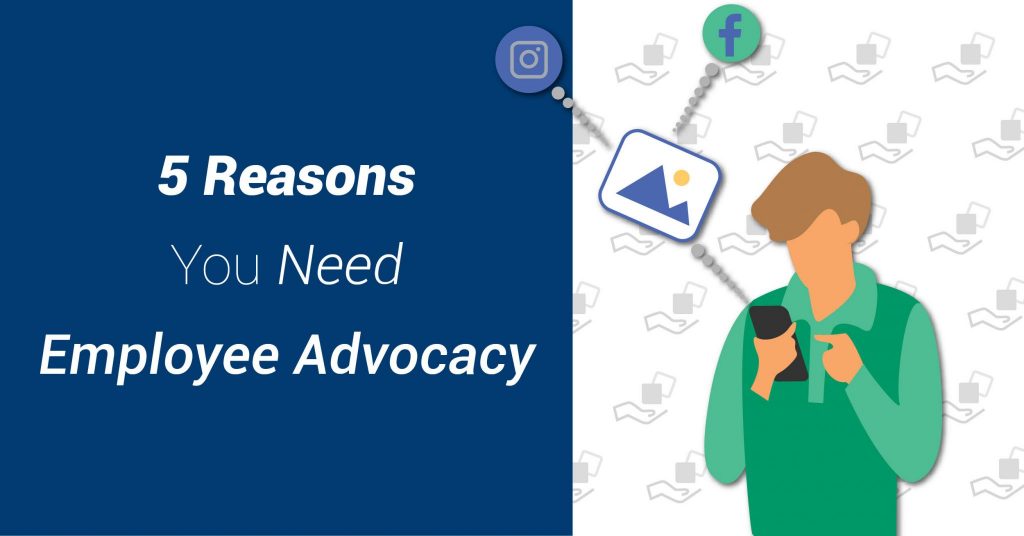One of the fastest-growing trends in social media is employee advocacy, in which employees become loyal ambassadors for your brand. With more and more companies adopting employee advocacy programs, you might be wondering what types of content your employees should be posting for you.
Of course, before you get to the posting part, you’ll need to implement an employee advocacy program of your own. We recommend reading our article 5 Big Reasons You Need an Employee Advocacy Program for the hows and whys of advocacy.
Related: 5 Big Reasons You Need an Employee Advocacy Program

As you develop your employee advocacy program, it will be helpful to give your employees some guidelines on the types of content you’d like for them to post. While you want employees to have some freedom to be creative with their posts, you also want to be sure you’re protecting sensitive information and presenting your brand in the best possible light.
Gather together with your employees to brainstorm different ideas, and come prepared to share with them the types of content they should be posting. The five categories below will get you rolling.
Branded Assets
The first obvious category is branded assets that you create and provide to your employees. They might be professionally created marketing graphics or videos, how-to tips about your products or services, contests, events or special promotions.
At the same time you’re creating these assets, consider creating a branded hashtag that employees can use when sharing on their personal pages. A dedicated hashtag about your brand helps to categorize your content and create conversations around your brand. You can also use the hashtag to locate employees’ content that you can then share on your company’s official accounts.
Learn more: How To Encourage Employee Advocacy On Social Media
A Day in the Life at Work
Although branded content has its place, it should not be the bulk of what’s shared via employee advocates. In fact, you’ll see that the remaining four categories do not mention corporate-branded content.
On the contrary, it’s the unpolished, unbranded types of content that will earn the greatest engagement on social media. This content showcases the authentic, human side of your business and is more likely to earn the trust and affection of your audience. Moreover, these types of content are more likely to be shared by your employees on their personal pages.
Own a coffee shop? The barista behind the counter will resonate more with your audience than a branded photo of coffee beans. It’s that simple. No matter what type of business you have, you need hyper-local content of your team members and their typical “day in the life” photos at work.
As employees post about your company on their personal pages, they’re doing more than just generating greater engagement for your accounts. They’re also actively contributing to the building of positive sentiment about your brand. The more that prospective customers and future team members see this content, the more they begin to view your company as likeable, trustworthy, and even socially and environmentally responsible under the right circumstances.
Related: 4 Types of Social Media Influencers to Power Up Your Brand

Events In and Out of the Office
Along with day-to-day photos, employees can also share photos and videos from special occasions or events both in and out of the office. Remind them to snap photos of birthdays at the office, team building events, and “national day” holidays (see calendar here) like National Hot Chocolate Day.
Again, you have opportunities to build culture as you’re building awareness. Host “bring your dog to work day” if you’re a pet-friendly company, or host a team lunch on the last Friday of the month. When you find ways to infuse fun into your company, your employees will naturally be more inclined to capture these moments on film and post them to social media.
The coolest part about these types of content — both candid moments and organized events — is that employees’ posts have a way of informing a company’s core values and culture. If employees are happy at work and posting about it, it’s a great indicator that you’re doing something right. If they’re not, and they don’t, it’s an opportunity to right the ship and make sure yours is a company that employees are proud to post about.
Answers to FAQ
Somewhere on your website, you might have a list of FAQ about your company. These FAQ can serve as ideas for the types of content your audience wants to see. Have an employee answer these FAQ, and the questions instantly become more interesting and engaging.
Any kind of company has certain FAQ that customers tend to ask. However, answers to FAQ work especially well for companies that have products or services that require explaining or step-by-step instructions.
If you have a furniture store that sells items requiring assembly, you can have employees be the experts and share their how-to instructions. Not only can your employees upload these videos to their own pages, but you can also use them on your corporate accounts.
Make sure you have clear answers to all your FAQ handy for employees so they’re giving “official” instructions. They’ll be more confident filming answers to FAQ if they have the correct tone and verbiage you want used for various situations. At the same time, encourage employees to use their own words and speak authentically to avoid sounding canned.
What Types of Content Should Your Employees Post?
Although each company is unique in the types of content they want employees to share, the common thread is authenticity. As long as your employees speak and write from the heart, and as long as they’re not sharing information you want kept private about your company, they should be successful as employee advocates.
A few final takeaways:
- Create social media guidelines about what employees can and cannot post about
- Have a social media policy that states when and how employees may use social media at work
- Create a culture of advocacy by partnering with your employees and incentivizing them with rewards for promoting your brand
- Use Rallio Activate technology to organize and streamline posting and collecting assets from employees that you otherwise wouldn’t have
The little moments at work are often the most meaningful for your employees. They spend a large part of their day working for you, and employee advocacy allows them to feel recognized, valued and heard.
